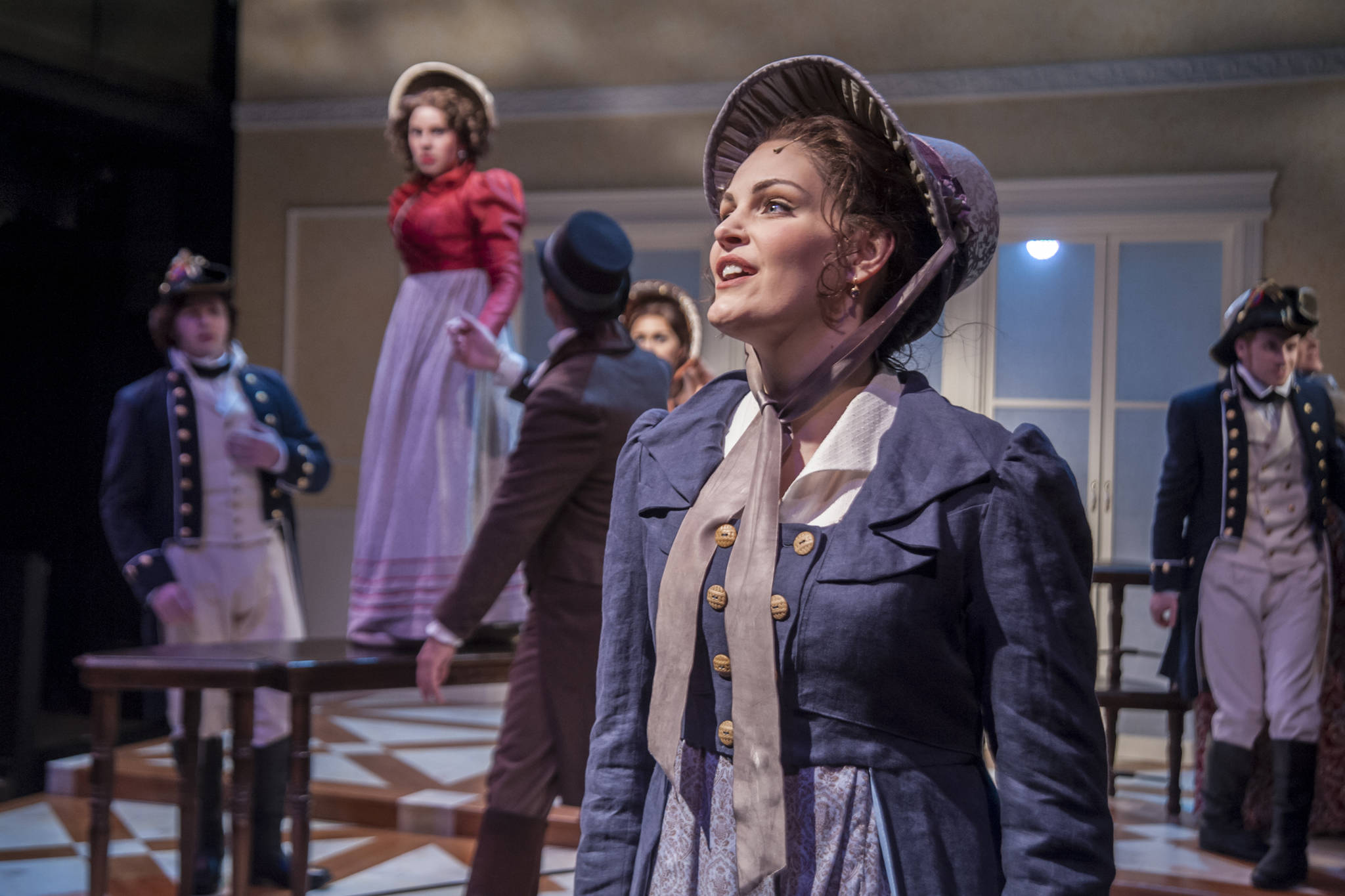The one Jane Austen heroine who starts her novel as a fully formed adult is Anne Elliot in Persuasion. Austen’s other five canonical novels are all bildungsromans to some extent. Even her sharpest heroines, Pride and Prejudice’s Elizabeth and the title meddler in Emma, still need to learn to distinguish the essential from the inessential in relationships, and their enlightenment is the book’s theme. But Anne underwent this process, painfully, eight years before her novel opens, when she was bullied by her snobbish family and an imperious family friend into refusing a proposal from the man she loved.
This backstory makes an enticing opening number for Persuasion the musical—book by Harold Taw, music and lyrics by Chris Jeffries, now premiering at Taproot—suggesting the tone of bittersweet regret that sombers Austen’s novel. It isn’t sustained, though; Taw, director Karen Lund, the actors, or possibly all three decided to go in a broader, less adult, less affecting direction. This definitely juices up the roles—and Taproot’s entire cast chomps into them with relish—but blunts the edge of the author’s satire. Jane was never harsher than to Anne’s bullies, especially to her father, who is, in Austenian parlance, an asshole; but here, as he’s broadened, so is he defanged. The show has a lot of jolly fun with Anne’s circle, but they’re boobs rather than the villains who in the book come chillingly close to simply ruining her life.
But this Persuasion does tellingly reproduce many of Austen’s themes and preocccupations: her admiration for the naval life; the does-he-or-doesn’t-he agony that racks Anne when her ex, Captain Wentworth (Matthew Posner, robustly resentful where Austen’s hero withdraws and broods), comes back into her life; the way a subtle social gesture can prove momentous if read correctly—and the ridiculousness, even dangerousness, of a society whose behavioral strictures make such hyper-scrutiny necessary. (Though this critique would be more pointed if the performances were less flamboyant; except for Cayman Ilika’s Anne, no one onstage seems to be chafing against anything.) Other aspects of the novel are brought out and spotlit: Anne’s relative Henrietta (Chelsea LeValley), with her own romantic choice to make, provides a lesson in self-assertion, and Wentworth’s friends Captain and Mrs. Harville (Nick DeSantis and Caitlin Frances), given a higher profile, become the musical’s outspoken conscience.
Jeffries’ skillful score sets Anne apart, and makes her glow, with the show’s most lyrical and elegiac music. He seasons the piece, set in 1814, with the country dances and folk airs Anne (and Jane herself) would have enjoyed for hours at her piano. His Act 2 opening number, as the characters converge on Bath—the prime see-and-be-seen vacation spot in Austen’s day—is a snappy march similar to Wentworth’s entrance song, suggesting that social climbing is its own sort of military maneuver. For his finale, Jeffries borrows, to stirring effect, a couple of pertinent lines from the book’s climax, Wentworth’s letter to Anne revealing his feelings. The Janeite in me longed to hear this letter set verbatim; Austen never wrote a more impassioned soliloquy, and it’s hard to imagine that Taw’s own awkward invented denouement will prove more satisfying to anyone, Austen aficionado or not.
Taproot Theatre, 204 N. 85th St., 781-9707, taproottheatre.org. $27–$47. 7:30 p.m. Wed.–Thurs., 8 p.m. Fri., 2 & 8 p.m. Sat. Ends Aug. 19.








